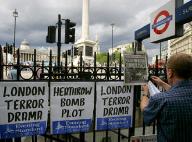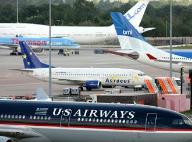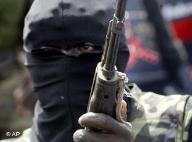Foiled British Attack Triggers Security Debate in Germany
The foiled plot to blow up planes flying from Britain to the US has reignited a security debate in Germany with politicians split on tightening counter-terrorism laws.
A day after news emerged that British police had stopped a potentially massive terrorist strike, Germany was debating the security lessons to be drawn from the bomb scare. Politicians from the ruling conservative Christian Democratic Party (CDU) called for a rethink of Germany's security concept.
"We have to ask ourselves whether we would have been as successful with our security measures," Wolfgang Bosbach, deputy parliamentary group leader of the CDU, told reporters.
"We have to determine whether, in a similar situation, we would have discovered the explosive material in baggage checks," Bosbach said, referring to reports that terrorists planned to smuggle liquid explosives in hand luggage on flights from Britain to the US.
Bavaria's Interior Minister Günther Beckstein of the Christian Social Union (CSU), the sister party of the CDU, said Germany had to be prepared for an abstract and heightened terror threat.
"We are also in the sights of the terrorists," Beckstein said.
Conservatives demand central anti-terror register
Conservative politicians are also in favor of introducing a Germany-wide anti-terrorism register, which has been a bone of contention for months between the government and the federal states.
 The planned register would not just contain a database of suspects and groups, but would also list names and details of foundations and companies with possible links to the Islamist scene. The idea is that all security, intelligence and counter-crime agencies both at the state and federal level would have access to the register.
The planned register would not just contain a database of suspects and groups, but would also list names and details of foundations and companies with possible links to the Islamist scene. The idea is that all security, intelligence and counter-crime agencies both at the state and federal level would have access to the register.On Friday, Beckstein said that the events in Britain showed that Germany needed a closer networking of its myriad security agencies if quick decisions needed to be taken in an emergency. Cooperation between the various agencies is too slow and bureaucratic at present, Beckstein said.
"A Germany-wide anti-terrorism register is urgently needed," Beckstein said, adding that security loopholes in German counter-terrorism laws also needed to be closed.
Hartmut Koschyk, CSU domestic security expert, said the government needed to agree on a legal framework that would allow the army to counter terrorist attacks in the air and on water.
He also demanded that the states be more careful about selecting people for naturalization.
"There are extremists who deliberately seek the protection of German citizenship," he said.
Opposition: security worries exaggerated
Opposition politicians strongly object to the proposals, saying the conservatives' security concerns are overblown.
Fritz Kuhn, parliamentary leader of the Green party said it was important that there is good cooperation between the police and intelligence agencies, but said he was against the idea of a national anti-terror register that would enable the police to automatically access all intelligence information.
Kuhn added that the current practice of information-sharing was "completely sufficient."
"It's important that we first see what exactly happened in England," Kuhn said. "The decisive thing is that security checks at airports have to be improved."
Sabine Leutheusser-Schnarrenberger, a former justice minister and member of the opposition free-market liberal FDP also called for a more level-headed discussion.
"The citizens shouldn't be made uneasy without a well-founded reason," Leutheusser-Schnarrenberger said, adding that she didn't think Germany was facing an increased terrorist threat.
DW staff (sp)
Deutsche Welle 08/2006




